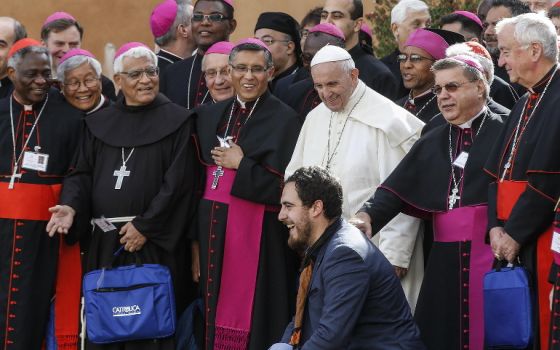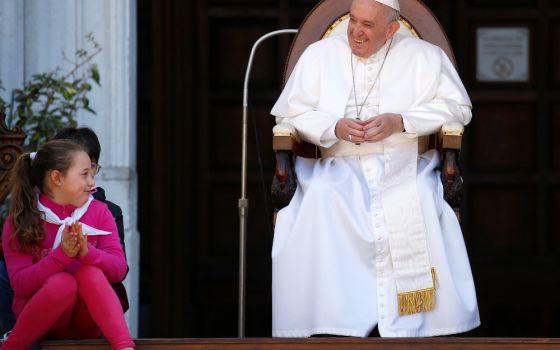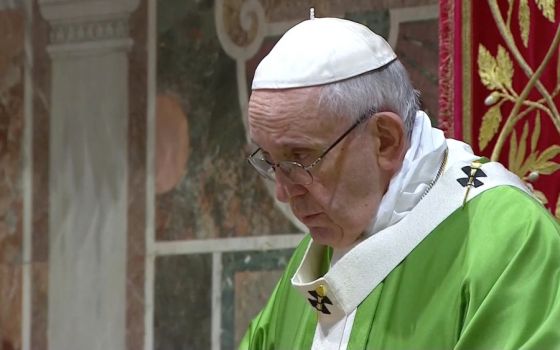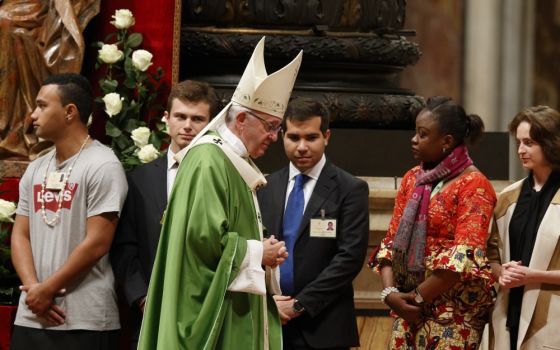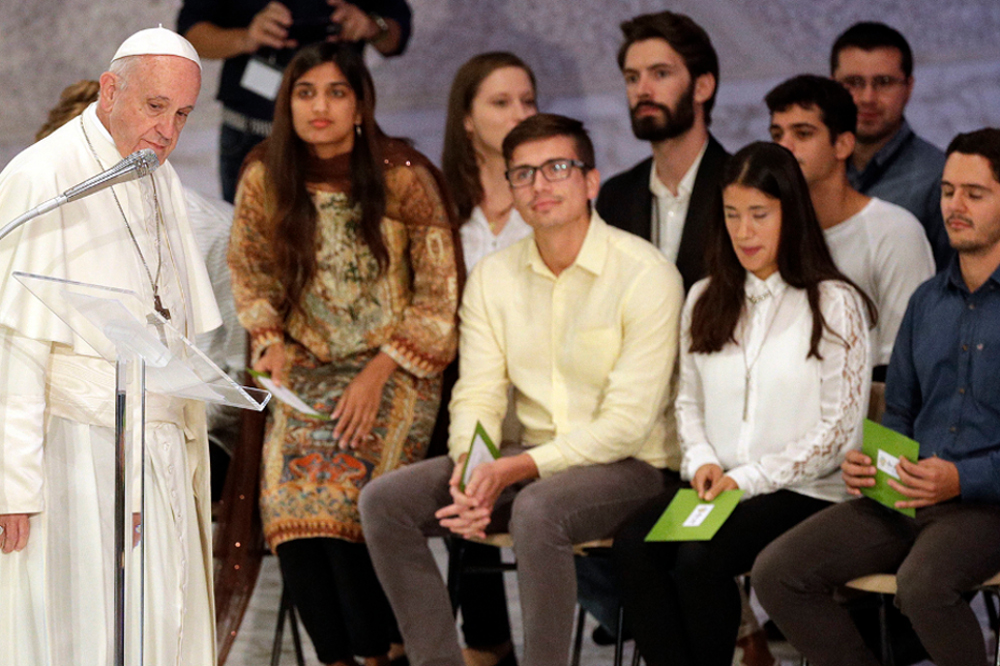
Pope Francis approaches the microphone to deliver his message in the Paul VI Hall as he meets with youth attending the synod at the Vatican on Oct. 6. (AP/Gregorio Borgia)
One of the buzzwords at the synod of Catholic bishops on young people is "listening." In the film "Casablanca," a kiss may be just a kiss, but in the Catholic Church, listening is never just listening.
The bishops, who were called to Rome for this monthlong meeting to discuss the church's outreach to the young, have been urged by Pope Francis to listen to one another and especially to young people. The meeting, which began Oct. 3 and concludes Oct. 28, is made up of 267 prelates and the 72 auditors, of whom about 30 are young people.
The young auditors, who sit in the back row of the synod hall, have been allowed to address the bishops and participate in small group discussions but not vote. They are a feisty group that, much to the surprise of the bishops, has not been shy about cheering and applauding speakers they like during the synod.
Nothing like this has been seen at earlier synods. At one of the coffee breaks, Francis made a point of going back to where the young people were sitting to tell them to keep making noise.
The word "listening" has become almost a mantra, repeated constantly by every synod participant who speaks to the media during press briefings. It got to the point that the reporters began rolling their eyes, "not again."
Not everyone, however, means the same thing when using the word "listening." The word is being used in at least three different ways at the synod.
On some level, everyone seems to understand that listening means attending to what young people say in order to find out their questions, their needs, their concerns. The bishops recognized before the synod started that there was no point in talking to young people about things they were not interested in. Programs had to be crafted to meet young people's needs as they see them, not as the bishops see them.
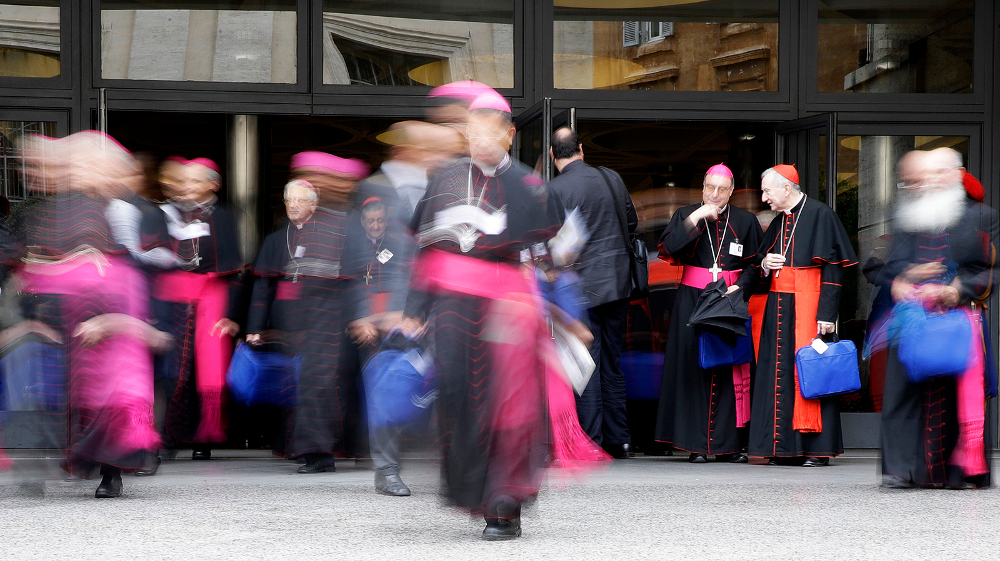
Cardinals and bishops leave the Synod Hall at the end of a morning session of the synod of bishops at the Vatican on Oct. 11. (AP/Alessandra Tarantino)
But many bishops are taking the church's traditional approach of looking to its theology for ideas and attempting to impose them on reality. This does not work today. Francis has been critical of ideologues of both the right and left who attempt to impose their ideas on people without considering the reality of people's lives. As Francis has said, "Facts are more important than ideas."
Perhaps this comes from Francis' early training as a chemist. If a scientist has a theory that does not fit reality, then his theory must change. If a philosopher or theologian has a theory that does not fit reality, then reality must change.
For all the talk of listening, then, for many bishops listening is simply a way to discover young people's questions, which they answer with the traditional theology of the church. When bishops here speak about the need for clear teaching, you can be certain that they already have the answers to any problem that the young auditors might present.
These bishops see young people as empty vessels into which they will pour content. Or worse, vessels filled with garbage that must be removed to make room for the church's content.
Advertisement
A second approach to listening is to hear what young people think about the church in order to discover how the church must change. Bishops who have been humbled by the sexual abuse crisis tend to listen this way. These bishops are more likely to admit that the church's traditional programs are not working. Things must change. The church needs reform.
These bishops are listening in order to get new ideas. They are hoping to learn about programs in other countries that are working. They want young people to accompany them in this path of discovery. Young people are not just recipients of the church's ministries, they can be active participants in their creation.
These are also the bishops who are most open to the pope's desire that the church become a discerning church, a church that listens, reflects and tries new things. With the pope they understand that clericalism endangers the church.
Finally, there is the kind of listening practiced by Brother Alois, prior of the Taizé community in France. He has brought listening to a whole other level.
A lot of listening is going on at the synod. What is being heard depends as much on the listener as the speaker.
The Taizé monastery in Burgundy is famous for attracting young people, including those who never go to church. Alois explained that Taizé is staffed by people who listen to young people to discover where the Spirit is alive in their lives, even in the lives of people who do not consider themselves believers. The job of these listeners is not to impose their ideas on the young; it is to help the young see the presence of the Spirit in their lives.
Alois is convinced that if God is love, then wherever there is love, compassion, a thirst for justice, a desire for reconciliation, then God is present even in the unbaptized nonbeliever. Alois believes that young people are already filled with the Spirit; they just need help in recognizing it.
This third approach to listening is radically different because it teaches the young to listen to their better selves and to hear in it the Spirit. Rather than filling the young with outside content, it first has them turn inward to listen to the Spirit within them.
A lot of listening is going on at the synod. What is being heard depends as much on the listener as the speaker.
[Jesuit Fr. Thomas Reese is a columnist for Religion News Service and author of Inside the Vatican: The Politics and Organization of the Catholic Church.]






